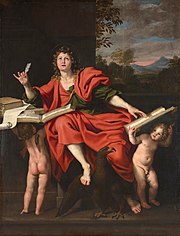Johannine literature
| Part of a series of articles on |
| John in the Bible |
|---|
 |
| Johannine literature |
| Authorship |
| Related literature |
| See also |
Johannine literature refers to the collection of New Testament works that are traditionally attributed to John the Apostle, John the Evangelist, or to the Johannine community.[1] They are usually dated to the period c. AD 60–110, with a minority of scholars such as John AT Robinson offering the earliest of these datings.
List[]
Johannine literature is traditionally considered to include the following works:[2]
- The Gospel of John
- The Johannine epistles
- The Book of Revelation
Authorship[]
Of these five books, the only one that explicitly identifies its author as a "John" is Revelation. Modern scholarship generally rejects the idea that this work is written by the same author as the other four documents.[3] The gospel identifies its author as the disciple whom Jesus loved, commonly identified with John the Evangelist since the end of the first century.[4]
Scholars have debated the authorship of Johannine literature (the Gospel of John, Epistles of John, and the Book of Revelation) since at least the third century, but especially since the Enlightenment. The authorship by John the Apostle is rejected by many modern scholars.[5][6]
References[]
- ^ Bruce et al. 2012, The Johannine Letters: I, II, and III John
- ^ Moloney & Harrington 1998, p. 1
- ^ Bruce et al. 2012, The Johannine Letters: I, II, and III John
- ^ Eusebius of Caesarea, Ecclesiastical History Book iii. Chapter xxiii.
- ^ Harris, Stephen L. (1985). Understanding the Bible: a Reader's Introduction (2nd ed.). Palo Alto: Mayfield. p. 355. ISBN 978-0-87484-696-6.
Although ancient traditions attributed to the Apostle John the Fourth Gospel, the Book of Revelation, and the three Epistles of John, modern scholars believe that he wrote none of them.
- ^ Kelly, Joseph F. (1 October 2012). History and Heresy: How Historical Forces Can Create Doctrinal Conflicts. Liturgical Press. p. 115. ISBN 978-0-8146-5999-1.
Sources[]
- Bruce, Frederick; Cain, Seymour; Davis, H. Grady; Faherty, Robert; Flusser, David (2012), "Biblical Literature", Encyclopædia Britannica
- Koester, Craig R. (2015). Revelation: A New Translation with Introduction and Commentary. The Anchor Yale Bible Commentaries. Vol. 38A. New Haven and London: Yale University Press. ISBN 9780300216912.
- Moloney, Francis; Harrington, Daniel (1998), Gospel of John, Collegeviille: Liturgical Press, ISBN 978-0-8146-5806-2, retrieved 2012-11-26
Bibliography[]
- Attridge, Harold W. (2008). "Part II: The Jesus Movements - Johannine Christianity". In Mitchell, Margaret M.; Young, Frances M. (eds.). The Cambridge History of Christianity, Volume 1: Origins to Constantine. Cambridge: Cambridge University Press. pp. 125–143. doi:10.1017/CHOL9780521812399.008. ISBN 9781139054836.
- Bellinzoni, Arthur J. (25 February 2000). The Early Christian Community: From Diversity to Unity to Orthodoxy. Lecture delivered to the Wells College Faculty Club.
- Black, C. Clifton; Smith, D. Moody; Spivey, Robert A., eds. (2019) [1969]. "John: The Gospel of Jesus' Glory". Anatomy of the New Testament (8th ed.). Minneapolis: Fortress Press. pp. 129–156. doi:10.2307/j.ctvcb5b9q.15. ISBN 978-1-5064-5711-6. OCLC 1082543536. S2CID 242455133.
- de Boer, Martinus C. (2018). "The Story of the Johannine Community and its Literature". In de Boer, Martinus C.; Lieu, Judith M. (eds.). The Oxford Handbook of Johannine Studies. Oxford and New York: Oxford University Press. doi:10.1093/oxfordhb/9780198739982.013.4. ISBN 9780198739982. LCCN 2018947872. S2CID 189193694.
- Byers, Andrew J. (2017). "The Johannine Vision of Community: Trends, Approaches, and 'Narrative Ecclesiology'". Ecclesiology and Theosis in the Gospel of John. Cambridge: Cambridge University Press. pp. 3–24. doi:10.1017/9781316823750.002. ISBN 9781316823750.
- Doole, J. Andrew (March 2021). "To Be 'An Out-of-the-Synagoguer'". Journal for the Study of the New Testament. SAGE Publications. 43 (3): 389–410. doi:10.1177/0142064X20973905. ISSN 1745-5294. S2CID 228846103.
- Ferreira, Johan (1998). Johannine Ecclesiology. The Library of New Testament Studies. Sheffield: Sheffield Academic Press. ISBN 9780567286833. LCCN 98156774.
- Hill, Charles E. (2005). "Part III: The Evidence for a Johannine Corpus". The Johannine Corpus in the Early Church. Oxford and New York: Oxford University Press. pp. 447–464. doi:10.1093/0199264589.003.0009. ISBN 9780199264582. OCLC 475098055.
- Lincoln, Andrew T. (2018). "The Johannine Vision of the Church". In Avis, Paul (ed.). The Oxford Handbook of Ecclesiology. Oxford and New York: Oxford University Press. pp. 98–118. doi:10.1093/oxfordhb/9780199645831.013.23. ISBN 9780199645831.
- Méndez, Hugo (March 2020). "Did the Johannine Community Exist?". Journal for the Study of the New Testament. SAGE Publications. 42 (3): 350–374. doi:10.1177/0142064X19890490. ISSN 1745-5294. S2CID 216330794.
- Ong, Hughson T. (2015). "The Gospel from a Specific Community but for All Christians: Understanding the Johannine Community as a "Community of Practice"". In Porter, Stanley E.; Ong, Hughson T. (eds.). The Origins of John's Gospel. Johannine Studies. Vol. 2. Leiden and Boston: Brill Publishers. pp. 101–123. doi:10.1163/9789004303164_007. ISBN 978-90-04-30316-4. ISSN 2214-2800.
- Painter, John (2010). "Johannine Literature: The Gospel and Letters of John". In Aune, David E. (ed.). The Blackwell Companion to the New Testament. Chichester, West Sussex: Wiley-Blackwell. pp. 344–372. doi:10.1002/9781444318937.ch20. ISBN 9781444318937.
- Reinhartz, Adele (2013). "Forging a New Identity: Johannine Rhetoric and the Audience of the Fourth Gospel". In Krans, Jan; Lietaert Peerbolte, L. J.; Smit, Peter-Ben; Zwiep, Arie W. (eds.). Paul, John, and Apocalyptic Eschatology: Studies in Honour of Martinus C. de Boer. Novum Testamentum: Supplements. Vol. 149. Leiden: Brill Publishers. pp. 123–134. doi:10.1163/9789004250369_009. ISBN 978-90-04-25026-0. ISSN 0167-9732. S2CID 171267332.
- 1st-century Christianity
- 2nd-century Christianity
- Biblical criticism
- New Testament content